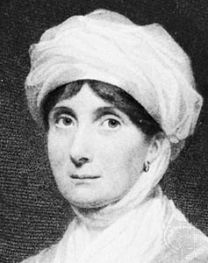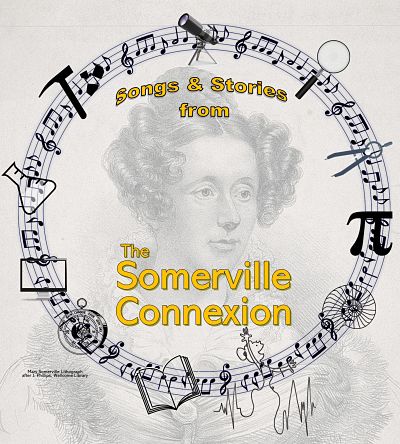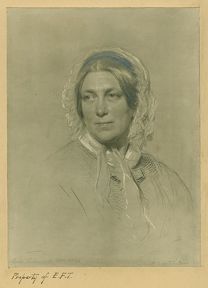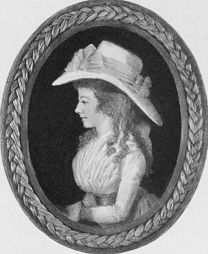Joanna Baillie (1762 – 1851)
Poet and Playwright

Joanna Baillie was born in the manse at Bothwell in Lanarkshire, Scotland. She lived much of her young life at Long Calderwood near Hamilton and moved to Hampstead in London in 1784 when she was in her early twenties. It was after her move to the metropolis that she published her first (annonymous) book of poems, and gradually she began to publish under her own name the plays that made her famous to her contemporaries.
Sir Walter Scott said of her play “Family Legend” – for which he wrote a prologue –
“You have only to imagine all that you could wish to give success to a play and your conceptions will still fall short of the complete and decided triumph of the ‘Family Legend'”
The Somerville Connexion
Mary Somerville thought of Baillie as “… a dear and valued friend ……”
However, she had more in common with today’s view of Baillie’s stage works which seem to have lost their lustre and are all but forgotten –
“….. Miss Baillie’s plays, though highly poetical, are not suited to the stage.”
Joanna Baillie, on the other hand, commenting on Somerville’s book, “On the Connexion of the Physical Sciences” lauds the author as one “…. who has done more to remove the light estimation in which the capacity of women is too often held, than all that has been accomplished by the whole sisterhood of poetical damsels and novel-writing authors…..”
There are many connexions between these two women, such as their circle of strong and illustrious women friends including the writers Harriet Martineau (1802- 1876) and Maria Edgeworth (1768 – 1849) pictured above.
I suspect a binding force in their friendship was their mutual love and deep understanding of the Scottish Song Tradition, shared with their close friend Sir Walter Scott. Baillie wrote many popular poems and songs in Scots, one of which “Saw Ye Johnny comin’?” was praised by Robert Burns for having “…genuine humour in the verses and lively originality in the air…”
When Baillie’s poem in English “Sweet Power of Song”, which she set to an Irish Air, was arranged by Ludwig van Beethoven I can hardly imagine how overjoyed they both must have been, given that Somerville, an accomplished pianist, loved to play his music.
(Click the blue button above to hear it)
Sweet Power of Song! That canst impart,
To lowland swain or mountaineer,
A gladness thrilling through the heart,
A joy so tender and so dear:
Sweet Power? That on a foreign strand
Canst the rough soldier’s bosom move,
With feelings of his native land,
As gentle as an infant’s love.
Sweet Power! That makest youthful heads
With thistle, leek, or shamrock crown’d,
Nod proudly as the carol sheds
Its spirit through the social round
Sweet Power! That cheer’st the daily toil
Of cottage maid or beldame poor
The ploughman on the furrow’d soil
Or herd-boy on the lonely moor;
Or he, by bards the shepherd hight,
Who mourns his maiden’s broken tye,
‘Till the sweet plaint, in woe’s despite
Hath made a bliss of agony.
Sweet Power of Song! Thanks flow to thee
From every kind and gentle breast!
Let ERIN’S CAMBRIA’S minstrels be
With BURN’S tuneful spirit blest!
Joanna Baillie
Songs and Stories from
“The Somerville Connexion”
7.30pm 24th July 2022
Stroud Green Festival
Holy Trinity Gardens, Granville Road, London, N4 4EL
![]()
A British Sign Language interpreted concert of music illuminating the hidden lives of exceptional women whose worlds revolved around the Queen of the Sciences, Astronomer and Mathematician Mary Somerville (1780-1872).
BOOK NOW ON THIS LINK




![Mary Somerville [Fairfax]. Lithograph after J. Phillips. Image Courtesy of Wellcome Library](https://www.electricvoicetheatre.co.uk/wp-content/uploads/2022/06/OPT-Mary-Somerville-Fairfax.-Lithograph-after-J.-Phillips.-Image-Courtesy-of-Wellcome-Library-London.-Wellcome-Images-images@wellcome.ac_.uk_-180x180.jpg)
![Mary Somerville [Fairfax]. Lithograph after J. Phillips. Image Courtesy of Wellcome Library](https://www.electricvoicetheatre.co.uk/wp-content/uploads/2022/06/OPT-Mary-Somerville-Fairfax.-Lithograph-after-J.-Phillips.-Image-Courtesy-of-Wellcome-Library-London.-Wellcome-Images-images@wellcome.ac_.uk_-495x400.jpg)


